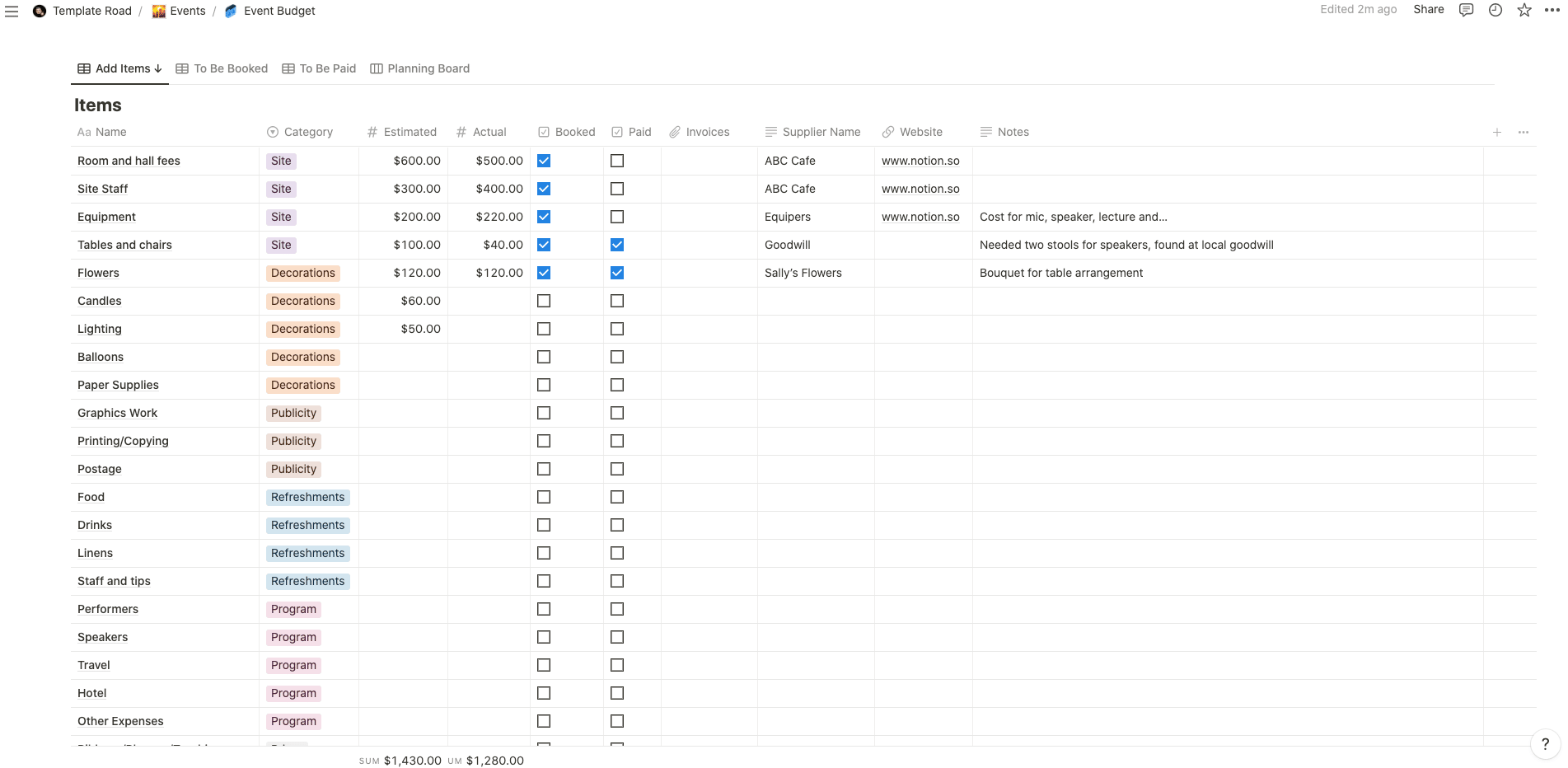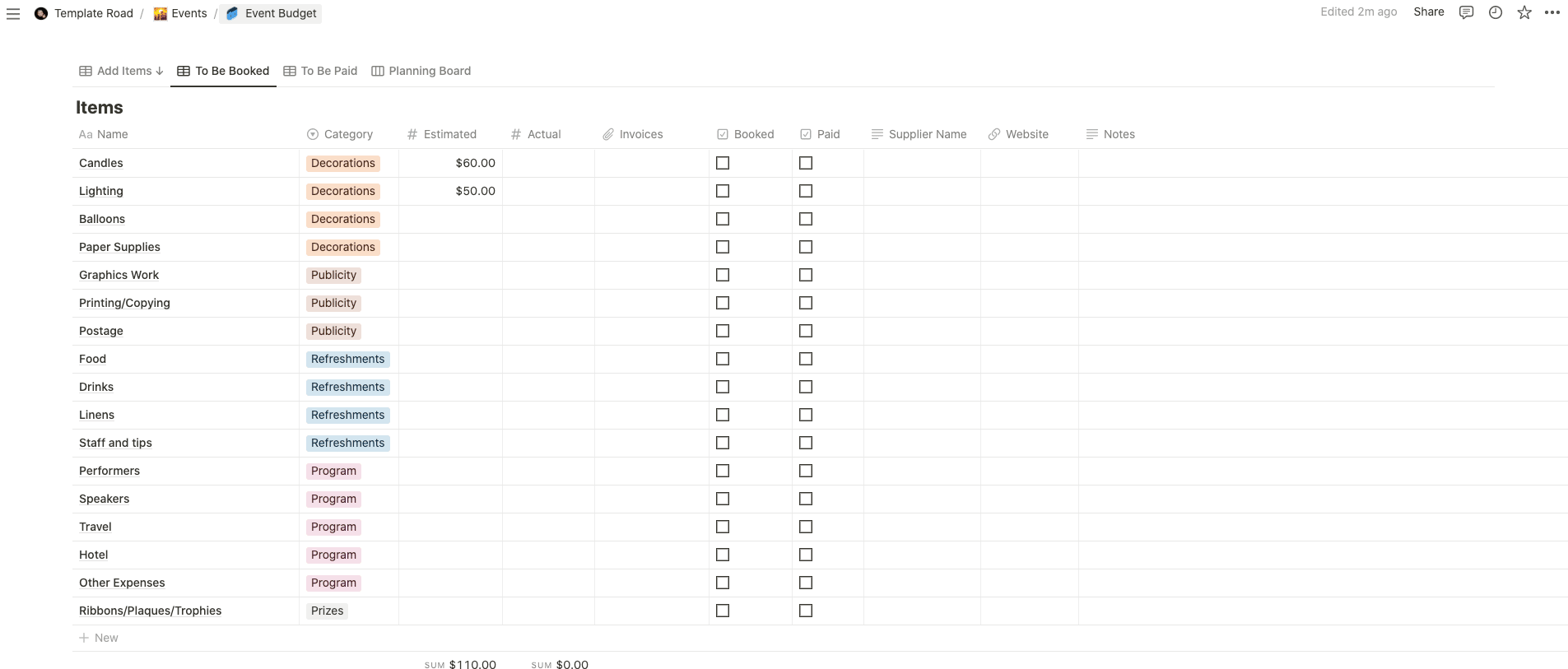Use this template to keep track of your event budget.
Buy on
Contents
Notion – Event Budget Template
Use this template to keep track of your event budget. Add expenses to a Category with the Estimated cost and relevant Notes. Update the sheet with the Actual cost and keep track of what has been Booked or Paid. Switch between views as you work on your budget.
This event budget will allow you to:
- Keep track of the various items needed for your event
- Add quantities and notes for better organization
- Track the estimated and actual costs of each item
- Visually plan your budget on a Planning Board
——————————————-
What you need before purchase
- Basic knowledge of how to use Notion
- Paid Notion account if you’re looking to add lots of content to your template / Notion account (sign up here). Not much content? You’re able to use their free account.
After purchase, you’ll be able to view the template immediately. The template can be added to your Notion account by:
- Click on the template download link in Gumroad
- When viewing the Notion template, click on the “Duplicate” link in the top-right of your screen
- The template will now be available in your own Notion account
For ongoing use, the steps are:
- Login to Notion and select the template you want to view
- Click on the Duplicate link in the top-right of your screen to create a copy to use
- You’ll be able to retain the Notion template and work on the Duplicate (with a new name) and can repeat this process whenever you want to use the template again
What is an Event Budget?
An event budget is a detailed breakdown of the costs associated with your wedding or special occasion, including food and beverage, flowers, decorations, entertainment, photography, videography, invitations, etc. It’s important to have a good idea of how much you can spend on these items before you start planning so that you don’t end up in debt at the end of the day!
How do I create my own event budget?
The steps to planning an event budget are:
- Determine your event and an overall budget
- Evaluate past events
- Research to understand the industry
- Create a high-level plan
- Get buy-in from stakeholders
Determine your event and an overall budget – The first step is to determine what type of event it will be (wedding, birthday party, anniversary celebration, etc.) and then set an overall budget based on this information. This should include all of the expenses related to the event such as venue rental fees, catering, entertainment, gifts, transportation, etc.
Evaluate past experiences – Once you know what type of event you want to host, research the average cost of similar events in order to get a better understanding of the range of prices. You may also consider asking friends and family who have hosted similar events about their experience.
Research the industry – If you are hosting a large event, you may need to hire professionals to help you organize everything. Make sure to find out if there are any additional costs involved with hiring someone else to assist you. For example, some companies charge extra for setup and cleanup services.
Create a high-level plan – Create a list of all of the different types of vendors you would like to use during the event. Include both local businesses and those located outside of your area. Determine which ones will work best within your budget and stick to them throughout the process.
Get buy-in from stakeholders – Share your plans with your family, friends, and other key stakeholders. Ask them to provide feedback and suggestions regarding the event. They may offer ideas that could save money or make things easier.
Different Types of Event Expenses
Let’s look at the expenses around events:
- Fixed and Variable Costs
- Expenses for In-Person Events
- Expenses for Virtual Events
Fixed Costs – Fixed costs are similar regardless of whether you’re having an in-person event or a virtual event. These include the cost of renting a space, software, hiring a DJ/MC, paying for caterers, florists, photographers, videographers, and more.
Variable Costs – Variable costs depend on the number of people attending the event. Some examples of variable costs include the price of alcohol, beverages, appetizers, desserts, hors d’oeuvres, and more.
Expenses for In-Person Events – When you’re planning an in-person event, you’ll likely incur fixed costs but also pay variable costs. Examples of fixed costs include the cost of renting the venue, hiring a DJ/ MC, paying for a caterer, florist, photographer, videographer, and more. Examples of variable costs include the cost of alcohol, beverages, hors d’oeuvre, dessert, and more.
Expenses for Virtual Events – With a virtual event, you won’t incur fixed costs because you don’t have to rent a space but you will have to pay for software.




















